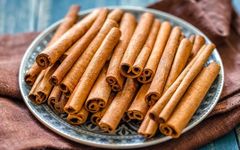
Cinnamon, also known as Ròuguì (肉桂), Jūnguì (菌桂), or Mǔguì (牡桂), is primarily produced in tropical and subtropical regions of provinces such as Guangdong, Guangxi, Fujian, Taiwan, and Yunnan. It is commonly found in our kitchens and is a spice that almost every household uses, often added to dishes like stewed lamb, baked bread, and marinated meats.
Moreover, cinnamon is not only the leader among spices but also the king of herbs, known for its ability to tonify the kidneys and enhance yang, as well as to warm and unblock the meridians. Today, we will discuss the roles of cinnamon as both a spice and a medicinal herb.

1. Nutritional Value of Cinnamon
Cinnamon has a high nutritional value as a spice, with the following contents per 100 grams:
100g Cinnamon Nutritional Content Scroll for more
● Energy: 245 kcal ● Protein: 4.2 g
● Fat: 2.7 g ● Saturated Fatty Acids: 0.1 g
● Monounsaturated Fatty Acids: 1.6 g ● Moisture: 10 g
● Carbohydrates: 25.5 g ● Sugar: 13.8 g
● Dietary Fiber: 54.3 g
● Folic Acid: 90 μg ● Sodium: 44 mg ● Magnesium: 230 mg
● Phosphorus: 235 mg ● Potassium: 1250 mg ● Calcium: 830 mg
● Iron: 39 mg ● Zinc: 3.8 mg ● Iodine: 0.5 μg
● Vitamin A: 161 μg
● Vitamin B1 (Thiamine): 0.27 mg
● Vitamin B2 (Riboflavin): 0.24 mg
● Niacin (Nicotinamide): 4.3 mg
● Vitamin C (Ascorbic Acid): 30 mg
● Vitamin E: 8.64 mg
● It also contains components such as benzaldehyde, cinnamaldehyde, eugenol, and coumarin.
Cinnamon not only helps to strengthen the spleen and aid digestion but also lowers blood lipids and blood pressure. It is now widely used in beverages, food flavoring, and high-end cosmetics. Due to food compatibility issues, it is best not to consume it with scallions.

2. Medicinal Efficacy of Cinnamon
Clinically, cinnamon is also a commonly used traditional Chinese medicine, known for its ability to invigorate blood circulation, warm the middle, dispel cold, tonify the kidneys, and restore yang. The clinical application of cinnamon is primarily due to its spicy and warming properties, often used to treat conditions in men caused by kidney yang deficiency such as impotence, nocturnal emissions, premature ejaculation, infertility, and frequent clear urination, as well as in women for conditions caused by kidney yang deficiency and cold stagnation leading to lower abdominal pain, infertility, scanty menstruation, menstrual clots, and dysmenorrhea.
Cinnamon can also be combined with other Chinese herbs to treat diseases, for example: dry ginger with cinnamon can invigorate blood and resolve stasis, red dates with cinnamon can nourish blood and calm the spirit, and cinnamon with Ròusōng (肉松) can moisten the intestines and relieve constipation, while coptis with cinnamon can aid sleep. However, it should not be used in combination with Chìshízhī (赤石脂).

3. Benefits of Cinnamon for the Cardiovascular System
Cinnamon has various pharmacological effects, with studies showing that it can lower blood sugar by about 10%, cholesterol by about 13%, and triglycerides, providing protective effects on the cardiovascular system, primarily manifested by its ability to dilate blood vessels, lower lipids, and exhibit antioxidant properties.
In traditional Chinese medicine, cinnamon is said to “assist heart yang,” and pharmacological studies indicate that the component cinnamaldehyde can dilate peripheral blood vessels, improve blood circulation in the extremities, and enhance myocardial blood supply, exhibiting certain anti-shock effects.
Other studies have shown that cinnamic acid can reduce myocardial ischemia-reperfusion injury, protecting the heart; coumarin can prevent venous or arterial thrombosis and increase coronary blood flow to the heart. Additionally, cinnamon contains naturally lipophilic terpenoids that can exert antioxidant effects and inhibit atherosclerosis.
In summary, appropriate consumption of cinnamon can improve cardiovascular diseases.

4. Incorporating Cinnamon into Your Diet
How can you add cinnamon to your daily diet? When selecting cinnamon, it is important to note that the more intense and slightly spicy flavor is generally more authentic, and it should not leave too much residue when chewed.
A simple way to consume cinnamon is by making tea or soup, such as Baoyuan Soup (保元汤) with pig trotters: 9g of Huangqi (黄芪), 3g of Renshen (人参), 1.5g of Ròuguì (肉桂), 3g of roasted licorice, and 1 pig trotter; this has the effects of nourishing blood, calming the spirit, replenishing blood, and enhancing the body’s resistance as well as beautifying the skin.
Another common method is to use it as a spice, grinding it into powder and adding a small amount of cinnamon powder when stewing soup or cooking, which can enhance the flavor.
Cinnamon pairs well with pig stomach to strengthen the spleen and stomach; it also pairs well with chicken liver to tonify the liver and kidneys and warm kidney yang.
Cinnamon cake is also a delicious sweet treat.

5. Who Should Avoid Cinnamon?
Although cinnamon is beneficial, it is not suitable for everyone. Cinnamon is very warming and can damage fluids and deplete the body’s moisture, so it should be avoided by those with colds, fevers, or a hot constitution; those with bleeding disorders, sore throat with yellow phlegm, or postpartum heat should also avoid it; individuals with acne, chickenpox, tuberculosis, or hyperthyroidism should not consume it.
Cinnamon is a spicy and warming herb, and traditional texts note it has “slight toxicity,” so it should not be used in excessive amounts.Additionally, cinnamon has a suppressive effect on the central nervous system, so infants and the elderly should not use it in large quantities; it can cause uterine congestion, so women should avoid large amounts during menstruation. Pregnant women should avoid it altogether.

More Educational Articles
➡️ What are the dangers of high blood pressure?
➡️ Will I inherit high blood pressure from my parents?
➡️ What risk factors can cause high blood pressure?
➡️ How can traditional Chinese medicine treat high blood pressure?
➡️ Why can’t I lower my blood pressure?
➡️ Can I stop taking antihypertensive medication once my blood pressure is normal?
➡️ What are the differences between hypertension in youth and old age?
➡️ Why do hypertensive patients need to limit salt intake?
➡️ What foods should hypertensive patients choose?


